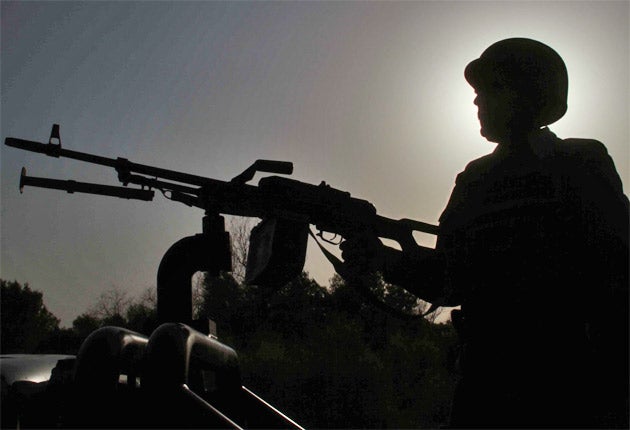CIA trains covert units of Afghans to continue the fight against Taliban
Shadowy, unaccountable forces accused of human rights abuses

Your support helps us to tell the story
From reproductive rights to climate change to Big Tech, The Independent is on the ground when the story is developing. Whether it's investigating the financials of Elon Musk's pro-Trump PAC or producing our latest documentary, 'The A Word', which shines a light on the American women fighting for reproductive rights, we know how important it is to parse out the facts from the messaging.
At such a critical moment in US history, we need reporters on the ground. Your donation allows us to keep sending journalists to speak to both sides of the story.
The Independent is trusted by Americans across the entire political spectrum. And unlike many other quality news outlets, we choose not to lock Americans out of our reporting and analysis with paywalls. We believe quality journalism should be available to everyone, paid for by those who can afford it.
Your support makes all the difference.Covert forces of CIA-trained Afghan paramilitaries are being built up to continue the US-led war on the Taliban as thousands of US troops prepare to leave the country.
Members of one shadowy group of some 400 men in southern Kandahar province have given The Independent a unique insight into their training and secret operations against militants as foreign troops prepare to quit Afghanistan by 2014.
Senior figures within one of the forces revealed that they were taught hand-to-hand combat by foreign military advisers, were delivered to targets by US Black Hawk helicopters and have received a letter of thanks from President Hamid Karzai for their work.
Despite their apparent military successes, one of the groups, the Kandahar Strike Force, has been dogged by rights abuse allegations that have raised questions about their role when their foreign handlers leave the country.
"These forces are the most shadowy and the most unaccountable in the country and it's a serious problem [that] nobody's taking responsibility for," said Rachel Reid, a senior policy adviser to the Open Society Foundation.
Under a revamped counterterror strategy released on 28 June, the US said it intended to "ensure the rapid degradation of al-Qa'ida's leadership structure" – and those of its adherents – using covert tactics going "beyond traditional intelligence, military, and law-enforcement functions".
Details of the group's operation were given in interviews by three former members in a prison outside Kabul where they are serving sentences, along with 38 comrades, for the killing of a police chief in 2009. The shoot-out was sparked by the detention of a member of the Kandahar Strike Force. They are appealing against their convictions.
The paramilitary groups are concentrated in eastern and southern Afghanistan where they collect intelligence, secure the border with Pakistan, and launch raids on militants from al-Qa'ida, the Taliban and the host of other militant groups. Taliban sources have told The Independent that the Kandahar Strike Force is the outfit they fear most.
Atal Afghanzai, a former commander of the Kandahar Strike Force, said that he was recruited when he heard the Americans were looking for guards. He was billeted at Camp Gecko, a sprawling place in the hills outside Kandahar City that was once home to the Taliban leader Mullah Omar but now houses a cafeteria, pool and fountain with catfish. According to The New York Times, the CIA and US Special Forces rented it from the late Ahmed Wali Karzai, half-brother to the Afghan President who was killed last week.
Foreign military advisers at the camp taught hand-to-hand combat and put new recruits through ambush training, as well as teaching them English, said Afghanzai. Everyone, he said, from the cook to the Special Forces advisers, was "working for OGA somehow": an acronym standing for "other government agencies" and generally used to refer to the CIA. "We had day raids, night raids. Any time we received intel from the NDS [Afghanistan's security service] that there were 10, 20, 50 insurgents gathering in a house or a garden, we'd launch an op." He did not discuss specific operations.
The Kandahar Strike Force grew to a 400-man outfit and became so effective that, according to Afghanzai, "President Karzai sent letters of thanks."
Two other members of the Kandahar Strike Force, Basir, a former platoon commander, and Fazel Mohammad, a deputy platoon commander, also held at the Pul-i-Charkhi prison, said they were serving Afghan commandos in 2004 when they were recruited to a "special unit". They said their commander was approached by an American adviser.
Prison authorities and the judge who presided over their 2009 trial confirmed that they worked at Camp Gecko. Afghan and Western officials also confirmed they were hired as private security guards working for the CIA at Camp Gecko and that they conducted raids.
Join our commenting forum
Join thought-provoking conversations, follow other Independent readers and see their replies
Comments